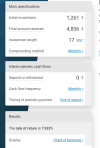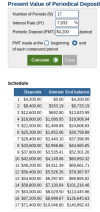Q1: Better with after tax account?
With no match and a "low" tax rate, it probably would have been better post tax -
*you* have the single person tax penalty - most won't.
as an aside, with traditional IRA - if you put-in, and take-out at the same tax rate, it doesn't make any difference on end $$.
this is where Roth wins - put in at a low rate, take out at zero in a higher bracket.
BUT - and never use
but as a transition word..
Would you have had the discipline not to spend it if it wasn't locked-up in a retirement account?
Just like a mortgage - it is overpaying for a piggy bank. Money that would be saved by renting would just disappear.
Q2: 457 vs IRA
On the 457 - is it for more than just the PD? there may be enough people in the twp making a high enough salary to max it out.
and $500+/month into retirement for a young person is a lot to ask (even if it is the best thing they could do in their early 20s.)
There may be a nondiscriminatory test and contribution test for the 457 - ie, if only the higher paid people are putting in, and it isn't benefiting most,
there will be limits on the high end.
@thegock, you got anything here?
Same as above - if the IRA investment didn't come straight out of the paycheck like the 457, would it have found itself in the retirement fund,
or carbon/titanium upgrade bits?
-----
Are you shopping for other 457 plan administrators?
-----
Good move rolling it into an IRA to save the fees - at 59-1/2 you might start rolling it into a Roth (maybe)
-----
are you going to have enough private sector work to collect some social security too?
that would be awesome!!













